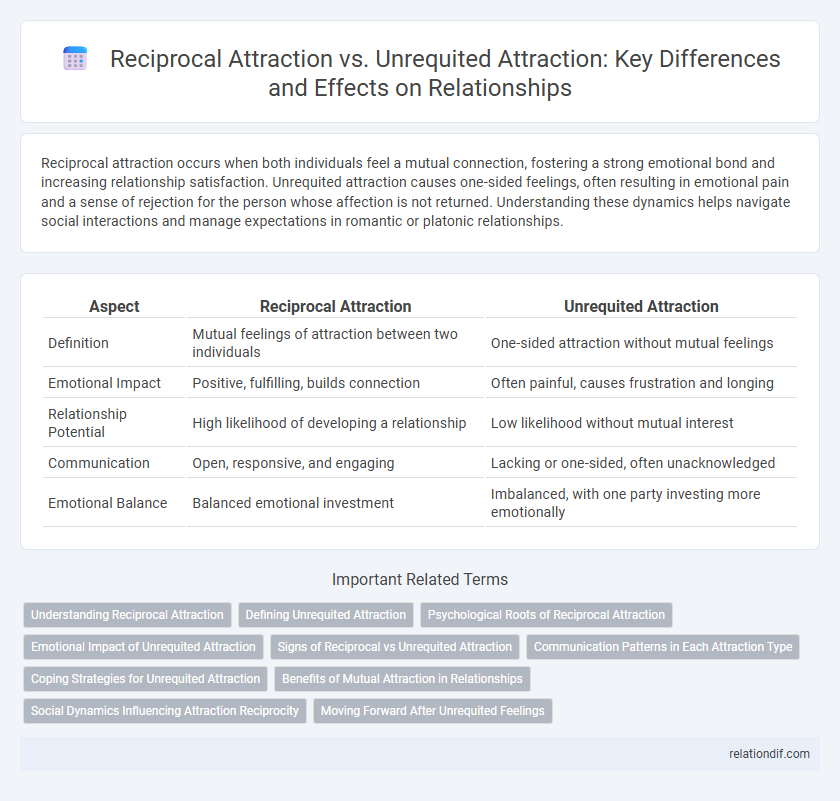Reciprocal attraction occurs when both individuals feel a mutual connection, fostering a strong emotional bond and increasing relationship satisfaction. Unrequited attraction causes one-sided feelings, often resulting in emotional pain and a sense of rejection for the person whose affection is not returned. Understanding these dynamics helps navigate social interactions and manage expectations in romantic or platonic relationships.
Table of Comparison
| Aspect | Reciprocal Attraction | Unrequited Attraction |
|---|---|---|
| Definition | Mutual feelings of attraction between two individuals | One-sided attraction without mutual feelings |
| Emotional Impact | Positive, fulfilling, builds connection | Often painful, causes frustration and longing |
| Relationship Potential | High likelihood of developing a relationship | Low likelihood without mutual interest |
| Communication | Open, responsive, and engaging | Lacking or one-sided, often unacknowledged |
| Emotional Balance | Balanced emotional investment | Imbalanced, with one party investing more emotionally |
Understanding Reciprocal Attraction
Reciprocal attraction occurs when both individuals experience mutual feelings of interest and affection, fostering a balanced and healthy emotional connection. This form of attraction promotes effective communication, trust, and shared experiences, which strengthen relationships over time. Recognizing reciprocal attraction enables individuals to build deeper bonds and cultivate lasting partnerships.
Defining Unrequited Attraction
Unrequited attraction occurs when one person experiences romantic or emotional interest toward another individual who does not return those feelings, creating an imbalance in emotional connection. This type of attraction often leads to feelings of longing, frustration, and emotional distress, as the desire is not reciprocated. Understanding unrequited attraction is crucial for recognizing the importance of mutual consent and emotional reciprocity in healthy relationships.
Psychological Roots of Reciprocal Attraction
Reciprocal attraction arises from mutual recognition of shared values, emotional responsiveness, and synchronized social signals that activate reward systems in the brain. Psychological roots include attachment styles fostering security and positive reinforcement cycles, which strengthen interpersonal bonds. This dynamic differs from unrequited attraction, where imbalance in reciprocation triggers feelings of rejection and emotional distress.
Emotional Impact of Unrequited Attraction
Unrequited attraction often leads to intense emotional distress, including feelings of rejection, low self-esteem, and persistent longing. This one-sided emotional investment can trigger anxiety and depressive symptoms, significantly impacting mental wellbeing. Unlike reciprocal attraction, where mutual feelings foster connection and happiness, unrequited attraction frequently results in emotional turmoil and decreased life satisfaction.
Signs of Reciprocal vs Unrequited Attraction
Signs of reciprocal attraction include consistent eye contact, mutual smiles, and mirrored body language, indicating shared interest and emotional connection. Unrequited attraction often manifests as one-sided efforts, such as one person initiating conversations while the other remains distant or uninterested. Physical proximity and genuine engagement typically signal reciprocal feelings, whereas avoidance and lack of response highlight unreciprocated affection.
Communication Patterns in Each Attraction Type
Reciprocal attraction features open, balanced communication where both parties actively listen, share feelings, and respond empathetically, fostering mutual understanding and trust. Unrequited attraction often involves one-sided communication, with the attracted individual expressing feelings that are not reciprocated or acknowledged, resulting in silence, avoidance, or dismissive responses from the other person. These contrasting communication patterns profoundly impact emotional connection, influencing relationship development and personal well-being.
Coping Strategies for Unrequited Attraction
Coping strategies for unrequited attraction emphasize emotional resilience and self-care, including setting boundaries to minimize contact and redirecting focus toward personal goals and social support networks. Practicing mindfulness and cognitive reframing helps individuals manage feelings of rejection and reduce rumination by cultivating acceptance and challenging negative thought patterns. Engaging in new activities and fostering relationships that offer mutual affection can also promote healing and restore emotional balance.
Benefits of Mutual Attraction in Relationships
Mutual attraction fosters emotional intimacy and trust, enhancing relationship stability and satisfaction. Couples experiencing reciprocal attraction often exhibit stronger communication skills and higher levels of empathy, which contribute to conflict resolution and long-term commitment. This mutual bond supports personal growth and shared goals, creating a fulfilling partnership.
Social Dynamics Influencing Attraction Reciprocity
Reciprocal attraction often thrives in social dynamics where mutual interests, shared values, and positive feedback loops enhance emotional connection and increase the likelihood of relationship formation. Unrequited attraction, in contrast, can stem from asymmetrical social cues or mismatched expectations, where one party's feelings are not mirrored, leading to imbalance in emotional investment. Social environments promoting open communication, empathy, and social validation are crucial in transforming unrequited attraction into reciprocal attraction, fostering stronger interpersonal bonds.
Moving Forward After Unrequited Feelings
Navigating the emotional challenges of unrequited attraction requires self-awareness and emotional resilience to move forward effectively. Engaging in activities that foster personal growth and surrounding oneself with supportive social networks can help shift focus from unreciprocated feelings. Understanding the difference between reciprocal attraction, which involves mutual interest, and unrequited attraction highlights the importance of setting healthy boundaries to protect emotional well-being.
Reciprocal Attraction vs Unrequited Attraction Infographic

 relationdif.com
relationdif.com